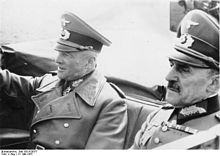Otto von Stülpnagel
| Otto von Stülpnagel | |
|---|---|

Otto von Stülpnagel (right) with Walther von Brauchitsch
|
|
| Born |
16 June 1878 Berlin, German Empire |
| Died | 6 February 1948 (aged 69) Cherche-Midi Prison, France |
| Buried at | Cimetière militaire allemand de Champigny-St. André |
| Allegiance |
|
| Service/branch |
Prussian Army Reichsheer Luftwaffe |
| Years of service | 1898–1942 |
| Rank | General der Infanterie |
| Battles/wars |
World War I World War II |
Otto von Stülpnagel (16 June 1878 – 6 February 1948) was a German military commander of occupied France during the Second World War.
Born 16 June 1878 in Berlin, Otto von Stülpnagel pursued a military career in keeping with his family’s long tradition of military service. Commissioned in 1898 and accepted as a member of the Imperial General Staff, he received several decorations for distinguished service on the western front during World War I. Nominated for the Pour le Mérite, Stülpnagel survived personnel cuts mandated by the Treaty of Versailles. Dismayed by accusations of German atrocities, he published an angry defence of German military conduct in a popular book entitled The Truth about German War Crimes in 1921. Promoted to the rank of Colonel (Oberst) in 1925 and Lieutenant General (Generalleutnant) in 1931, Stülpnagel played a leading role in the Reichswehr in conjunction with Kurt von Schleicher and Freiherr von Bussche during the Weimar era. Transferred to the fledgling Luftwaffe in 1934, Stülpnagel eventually took charge of the air force academy before falling from favor and retiring in March 1939.
Days before the German invasion of Poland, Hitler recalled Stülpnagel to active service and placed him in charge of a military district in Austria (Wehrkreise XVII), and he held the latter post for fourteen months.
On 25 October 1940, German army high command transferred Otto von Stülpnagel to France and placed him in charge of a military government with the title of Military Commander in France (Militärbefehlshaber in Frankreich or MBF). Not without controversy, this last assignment defined Stülpnagel’s career.
Orders from Hitler placed the army and the MBF in charge of “security” but allowed other state and Nazi party agencies to exercise a degree of influence in Occupied France. The German ambassador in Paris, Otto Abetz, first supervised and later controlled diplomatic relations between France and Germany, but the power amounted to little in practice. Hitler would not allow his ambassador to trade concessions for French cooperation, and formal negotiations between the Third Reich and Vichy regime came to naught. Able to control the flow of vital raw materials, food, and people across the demarcation line that separated occupied from unoccupied France, Stülpnagel could reward French cooperation by allowing people and goods to cross military checkpoints, or he could seal the borders and bring the French economy to a grinding halt. Control over both the demarcation line inside France and borders with Germany and Belgium gave the MBF considerable influence over German policy and French affairs. Otto von Stülpnagel played a major role in Franco-German relations between October 1940 and January 1942.
...
Wikipedia
